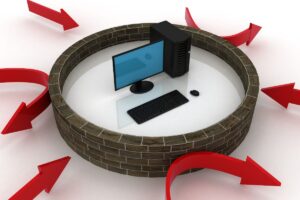Of all the challenges facing Southern Colorado businesses, impressing upon employees the need for strong cybersecurity protocols is perhaps the most critical – and that is where this cybersecurity guide can help.
Cybersecurity is a shared responsibility, and everyone in your company needs to take part in keeping your data (and theirs) safe on the web. In this article, our experts in cybersecurity guide you through the maze of constantly evolving cyber threats.
Why Do You Need A Cybersecurity Guide?
Imagine you are in Denver. You have a basic understanding of where downtown is, but as you are meandering your way through the streets, you find that you have taken a wrong turn somewhere and are in an area where your natural curiosity could get you into real trouble. Would you appreciate having a guide who knows the neighborhood well and can lead you back to safety?
This is what a cybersecurity guide can do for you and your employees – keep you all on a safe path that decreases the chances of getting into real trouble on the internet.
Cybersecurity Guidelines For Everyone In Your Company
Here are five basic rules of the internet your employees should follow to keep your network secure:
 Watch Where You Are Going
Watch Where You Are Going
This is the number one rule in our cybersecurity guide because being mindful of where you are going can keep you from taking a wrong turn. Navigating to questionable websites – ones off the beaten path and down dark alleys – can increase your risk of virus and malware infection, identity theft, and data corruption.
Cybercriminals are experts at hiding their intent and will do everything possible to lead you away from safety, including misusing domain masking or URL masking technology.
There are many legitimate reasons to redirect users to a new webpage on an existing domain. For instance, companies in the midst of rebranding may forward their current contact page (i.e., example.com/about/) to a new, updated page (example.com/our-story).
However, cybercriminals can misuse this tool to direct users to malicious websites. To ensure you and your employees do not fall victim to this ploy, only surf sites with valid security certificates (indicated by the lock in the address bar), check links for “https” before the domain, and examine the domain name for small changes or misspellings that could indicate redirection to a malicious website.
Look Out For Pirates
We understand that the latest Adobe and Microsoft products can be expensive. However, websites that promise name-brand software or streaming services for free or deeply discounted prices may be deceiving you into downloading pirated, corrupted software.
Pirated software and streaming services are a multi-billion dollar industry that could seriously compromise your network security. You can protect your business interests by remembering that a free download that seems too good to be true – probably is.
Learn Who To Open Up To
No cybersecurity guide would be complete without a section on emails and other digital communications. From standard emails to team collaboration software, digital communications are an integral part of day-to-day life in the business world.
Cybercriminals know that a well-planned phishing and mining email or message can wreak havoc and are constantly developing new strategies to trick users into opening messages, downloading attachments, and following links.
To protect your data, be aware of who is trying to communicate with you, and don’t open emails from just anyone. While likely a majority of the emails that make their way to your inbox have been pushed through spam filters, that does not mean that every email is automatically safe to open.
Receiving emails from individuals you do not know or which contain suspicious subject lines are easy to spot and avoid. But even emails from what we believe to be trusted senders may have malicious content, such as key-loggers or viruses embedded in an attachment.
Keep a vigilant eye for anything suspicious and run an antivirus scan on any attachments before downloading.
You Might Like: What Are the 7 Elements of Small Business Cybersecurity?
Avoid Things That Go POP! In The Night
Most modern internet browsers include pop-up blockers to prevent unwanted windows from opening while surfing the web. We recommend that users take advantage of this feature and only allow pop-ups temporarily from trusted sites.
If you do find yourself inundated with pop-ups, here are a few recommendations for dealing with them:
First, be careful of where you click. Some pop-ups mimic real Windows system messages. Even clicking cancel in the “message box” can expose you to attack. Instead, use the X in the topmost left of the box.
Second, if the pop-up does not close, pull up your Task Manager by selecting CTRL+ALT+DELETE on your keyboard. In the list of running programs, choose the browser you are using and click on the End Task button.
If all else fails, you may need to save your open files and reboot your system. Once your computer comes back up (and before connecting to your network), run thorough antivirus and anti-malware scans to ensure there is no corruption.
Batten Down the Hatches
This final rule in our cybersecurity guide is to be proactive.
Antivirus protection is a must for any operating system. Schedule regular updates for both the antivirus definitions and the programs themselves, regularly schedule scans to check your entire system, and enable real-time scanning of attachments and thumb drives. If your antivirus software discovers a threat, choose to clean, then quarantine. If you determine the file is non-critical, you can delete the file altogether.
 Firewalls are another must for computers and networks. This digital security system monitors all incoming and outgoing traffic on your system to ensure that only authorized communications are permitted. At the minimum, you should ensure that your Windows firewall is enabled, but we recommend investing in a more robust firewall. You cannot be too careful with protecting your business’ data and employees’ personal information.
Firewalls are another must for computers and networks. This digital security system monitors all incoming and outgoing traffic on your system to ensure that only authorized communications are permitted. At the minimum, you should ensure that your Windows firewall is enabled, but we recommend investing in a more robust firewall. You cannot be too careful with protecting your business’ data and employees’ personal information.
Related: Tips for Securing Your Online Identity With Strong Passwords
Installing system-critical updates will proactively protect your system and network. Most operating system manufacturers release updated versions that “patch” holes that will otherwise leave your system open to attack.
And while no business wants to be the victim of a cyber attack, you can significantly speed up recovery time by performing regular back-ups. Because back-ups to physical drives are inherently problematic, we recommend cloud-based back-ups that run automatically.
Amnet: Expert Cybersecurity Guide For Colorado Businesses
Everyone who works for your company – from the CEO to the customer service representative – must understand the importance of cybersecurity and be willing to share responsibility for protecting the company. One of the easiest ways to protect your business is by hiring a managed IT service provider to audit your network for vulnerabilities, perform penetration testing, and educate your employees on the latest cybersecurity threats.
Amnet is Colorado’s leader in cybersecurity solutions and managed IT services. We have the knowledge and experience to guide you through the information superhighway without incident. Contact us today for your free quote!

